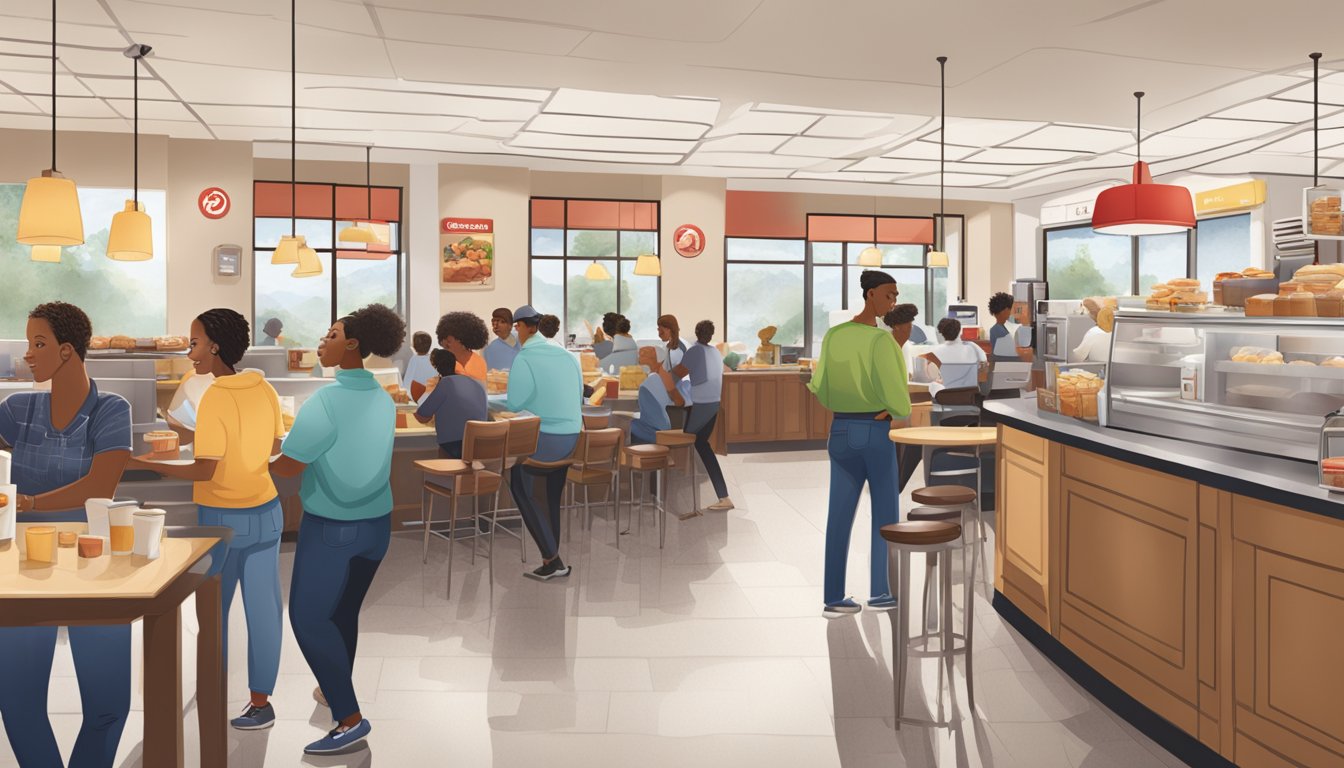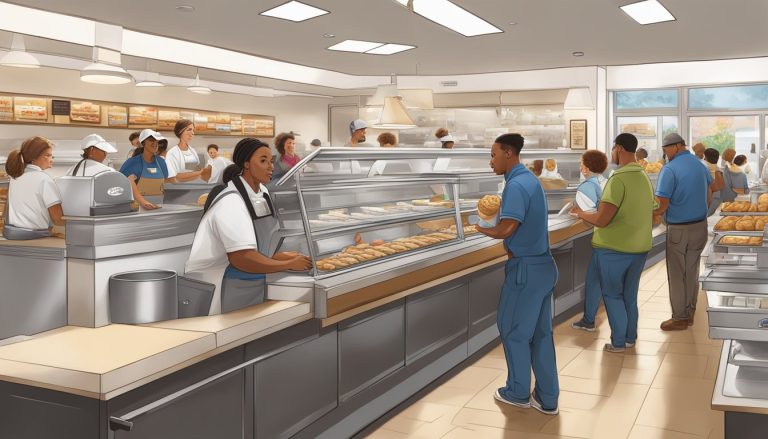Chick-fil-A’s breakfast menu has become a staple for many Americans seeking a quick, tasty start to their workday. The restaurant chain’s commitment to quality and customer service extends to their morning offerings, reflecting broader trends in American work culture.
Chick-fil-A’s breakfast menu ends at 10:30 a.m., catering to early risers and those with traditional work schedules. This cutoff time aligns with the fast-paced nature of modern workplaces, where efficiency and punctuality are highly valued. The limited breakfast hours also create a sense of urgency, encouraging customers to prioritize their morning routine.
The popularity of Chick-fil-A’s breakfast speaks to the evolving relationship between food and work in America. As more people seek convenient, on-the-go options, fast food chains have adapted to meet these changing needs. Chick-fil-A’s success in this arena demonstrates how companies can thrive by understanding and responding to the demands of a busy workforce.
Chick-fil-A: A Company Overview
Chick-fil-A has grown from a small diner to a fast food empire, known for its chicken sandwiches and unique company culture. The company’s success is rooted in its founder’s vision and values.
The Legacy of Truett Cathy
S. Truett Cathy founded Chick-fil-A in 1946, starting with a diner called the Dwarf Grill in Georgia. His innovative approach to fast food led to the creation of the original chicken sandwich in 1964. Cathy’s Christian values shaped the company’s principles, including the decision to close restaurants on Sundays.
This policy, established to give employees time for rest and worship, remains in place today. Cathy’s commitment to quality food and exceptional customer service became hallmarks of the Chick-fil-A brand.
The founder’s philosophy of treating employees and customers with respect contributed significantly to the company’s growth and reputation.
S. Truett Cathy Brands and Franchising
Chick-fil-A’s expansion strategy focused on franchising, allowing the company to grow while maintaining its core values. The company’s franchising model is unique in the fast food industry.
Chick-fil-A selects franchisees carefully, looking for individuals who align with the company’s values and service standards. This approach has resulted in a network of over 2,600 restaurants across 48 states.
In addition to Chick-fil-A, S. Truett Cathy developed other brands:
- Dwarf House: Full-service restaurants offering an expanded menu
- Truett’s Luau: A Hawaiian-themed restaurant concept
These brands complement the main Chick-fil-A chain, providing diverse dining experiences while maintaining the company’s commitment to quality.
Navigating the Digital Marketplace
Chick-fil-A has embraced digital technology to enhance customer experience and streamline operations. The company launched its mobile app in 2016, allowing customers to order and pay ahead, earning rewards points for their purchases.
Key digital initiatives include:
- Online ordering and delivery partnerships
- Drive-thru innovations to improve efficiency
- Social media engagement to connect with customers
The company has also invested in data analytics to optimize menu offerings and restaurant locations. These digital efforts have helped Chick-fil-A maintain its competitive edge in the fast food market.
Chick-fil-A continues to adapt to changing consumer preferences while staying true to its founding principles of quality food and exceptional service.
American Work Culture and Its Evolution
American work culture has undergone significant changes in recent decades. Companies are increasingly adopting progressive leadership styles and emphasizing employee well-being alongside productivity.
The Influence of Servant Leadership
Servant leadership has gained traction in American workplaces. This approach prioritizes the growth and well-being of employees and communities. Leaders focus on empowering their teams, fostering collaboration, and creating a supportive environment.
Many organizations now provide mentorship programs and professional development opportunities. These initiatives help employees enhance their skills and advance their careers.
Servant leaders actively listen to their team members’ concerns and ideas. They encourage open communication and value diverse perspectives. This leadership style often results in higher employee satisfaction and engagement.
Promoting Work-Life Balance and Inclusion
American companies are recognizing the importance of work-life balance. Flexible work arrangements, such as remote work options and adjustable schedules, have become more common.
Organizations are implementing policies to support employee wellness. These may include paid time off for mental health days, fitness programs, and stress management workshops.
Inclusion has become a key focus in American work culture. Companies are striving to create diverse and equitable workplaces. This involves implementing unbiased hiring practices, offering diversity training, and establishing employee resource groups.
Many businesses now celebrate different cultural holidays and organize events to promote inclusivity. These efforts aim to create a sense of belonging for all employees, regardless of their background or identity.
The Role of Leadership in Shaping Business
Leadership plays a pivotal role in shaping organizational culture and values. At Chick-fil-A, leaders have cultivated a unique environment based on biblical principles and a focus on character, competency, and chemistry.
Biblical Principles and Corporate Ethics
Chick-fil-A’s leadership draws inspiration from biblical teachings to guide corporate ethics. The company emphasizes integrity, service, and respect for all individuals. Leaders model these values through their actions and decision-making processes.
This approach has led to low turnover rates among top executives. Many leaders have stayed with the company for decades, reinforcing a consistent ethical framework. The alignment between personal and corporate values creates a strong foundation for long-term success.
Chick-fil-A’s talent selection process prioritizes character alongside skills and experience. This ensures new hires fit seamlessly into the existing culture and uphold its core principles.
Cultivating a Culture of Trust and Unity
Chick-fil-A’s leadership fosters an environment of trust and unity throughout the organization. The company invests heavily in employee development programs, such as the Leadership Development Program (LDP). This initiative exposes emerging leaders to various aspects of the business.
By prioritizing open communication and shared goals, leaders create a sense of common purpose among team members. This unity extends to franchisees, who are carefully selected to align with the company’s values and vision.
Trust is built through consistent actions and transparent decision-making. Leaders at Chick-fil-A strive to be accessible and supportive, encouraging employees at all levels to contribute ideas and feedback.
Human Resources Strategies at Chick-fil-A
Chick-fil-A’s human resources strategies focus on careful talent selection and retention through engagement and purpose. These approaches align with the company’s values and contribute to its success in the fast food industry.
Talent Selection for Cultural Fit and Excellence
Chick-fil-A prioritizes hiring individuals who align with its corporate culture and values. The company seeks candidates who demonstrate a strong work ethic, customer service orientation, and leadership potential.
Interviews often include behavioral questions to assess cultural fit. Chick-fil-A also uses role-playing exercises to evaluate customer interaction skills.
The company’s talent selection process extends to potential franchise owners. Many franchise opportunities are offered to long-term employees who have proven their alignment with Chick-fil-A’s mission and values.
This selective approach ensures a workforce that embodies the company’s principles and maintains its reputation for excellent service.
Retaining Talent Through Engagement and Purpose
Chick-fil-A implements strategies to keep employees motivated and committed to the organization. The company offers clear paths for career advancement, encouraging team members to pursue leadership roles.
Mentorship programs pair experienced staff with newer employees, fostering professional growth and strengthening organizational bonds. Chick-fil-A provides resources and training to support employee development.
The company’s promotion-from-within culture creates opportunities for long-term career growth. Many franchise owners began as part-time employees, serving as inspiring examples for current staff.
Chick-fil-A emphasizes its corporate purpose, connecting employees’ work to a larger mission. This sense of purpose, combined with engagement initiatives, contributes to higher job satisfaction and retention rates.
Customer Experience and Loyalty Programs
Chick-fil-A prioritizes customer satisfaction through exceptional service and a rewards program. The company’s approach fosters loyalty and enhances the overall dining experience.
Introducing Chick-fil-A One
Chick-fil-A One is the restaurant’s digital loyalty program. It offers customers points for purchases, which can be redeemed for free food items. The app is available on both the App Store and Google Play.
Members receive exclusive offers and discounts. Tiered membership levels provide increasing benefits. Higher tiers unlock more rewards and personalized perks.
The program’s success stems from its focus on customer preferences. Data shows that 60% of Chick-fil-A customers join loyalty programs for discounts. This is higher than the 47% average for the U.S. population.
Building Customer Trust Through Quality Service
Chick-fil-A’s commitment to service excellence builds strong customer relationships. Employees are trained to deliver warm, friendly interactions. The company’s famous “my pleasure” response exemplifies this approach.
The restaurant chain invests heavily in employee training and development. This ensures consistent service quality across locations. Staff members are empowered to resolve issues promptly.
Chick-fil-A’s culture emphasizes treating customers with honor and respect. This philosophy extends to all aspects of the dining experience. From order accuracy to cleanliness, every detail matters.
The combination of quality food and exceptional service creates a positive feedback loop. Satisfied customers become repeat visitors and brand advocates.
Health Consciousness in Fast Food Industry

Fast food chains are adapting to meet the growing demand for healthier options. This shift reflects changing consumer preferences and a heightened awareness of nutrition and wellness.
Nutritional Information and Menu Transparency
Fast food restaurants now provide detailed nutritional information for their menu items. Calorie counts, fat content, and sodium levels are prominently displayed on menu boards and packaging. Many chains offer online calculators to help customers make informed choices.
Chick-fil-A has expanded its menu to include healthier breakfast options in select markets. These additions cater to health-conscious consumers seeking nutritious morning meals. The company emphasizes natural ingredients and lighter fare to appeal to this demographic.
Menu transparency extends beyond nutritional facts. Fast food chains are disclosing ingredient lists and sourcing practices. This openness builds trust with customers who prioritize food quality and sustainability.
Addressing Allergens and Customer Health Data
Fast food restaurants have improved their handling of food allergies and intolerances. Many chains now offer allergen menus and ingredient lists to help customers with dietary restrictions make safe choices.
Staff training on allergen awareness has become a priority. Employees learn to prevent cross-contamination and respond to allergy-related inquiries. Some restaurants use separate preparation areas for allergy-friendly items.
Digital ordering platforms allow customers to input health data and dietary preferences. This technology enables personalized menu recommendations based on individual health needs. It also helps restaurants track trends in customer health concerns and adapt their offerings accordingly.
Corporate Social Responsibility

Chick-fil-A emphasizes community engagement and ethical business practices. The company aims to make a positive impact through various initiatives and policies.
Chick-fil-A’s Commitment to Community and Environment
Chick-fil-A launched the True Inspiration Awards program to support local nonprofits. In 2021, they distributed $5 million to 34 organizations chosen by Chick-fil-A One members. The company also established the Chick-fil-A Together Fund to assist employees in times of need.
Environmental efforts include sustainable packaging initiatives and responsible sourcing practices. Chick-fil-A has set goals to reduce waste and increase recycling in its restaurants.
The company invests in education programs for its team members. By 2025, Chick-fil-A aims to impact over 50,000 restaurant employees through these initiatives.
Privacy and Accessibility Policies
Chick-fil-A maintains a comprehensive privacy policy to protect customer data. This includes a California Privacy Notice for residents of that state. The company also has a specific cookie and internet-based advertising policy.
Accessibility is a priority for Chick-fil-A. They work to ensure their digital platforms and physical locations are usable by people with disabilities. This commitment extends to their website, mobile app, and in-restaurant experiences.
Chick-fil-A regularly updates these policies to comply with changing regulations and best practices in data protection and accessibility.
Marketing and Merchandise
Chick-fil-A’s marketing strategy extends beyond its menu offerings, encompassing merchandise and public relations efforts. The company engages customers through various channels and maintains a strong media presence.
Engaging with Customers Beyond the Menu
Chick-fil-A offers a range of branded merchandise, allowing fans to show their love for the chain. The company’s online store features clothing items like t-shirts, hats, and socks adorned with the iconic Chick-fil-A logo and cow mascot.
Seasonal promotions often include limited-edition products, such as holiday-themed gift cards or collectible plush toys. These items create additional touchpoints with customers and serve as walking advertisements.
Chick-fil-A also leverages social media platforms to connect with its audience. The brand’s accounts share menu updates, behind-the-scenes content, and user-generated posts, fostering a sense of community among followers.
Press Room and Public Relations
Chick-fil-A maintains a comprehensive press room on its website, providing media professionals and the public with up-to-date information. This resource includes press releases, fact sheets, and high-resolution images for use in news articles.
The company’s public relations team actively manages its reputation through strategic communications. They address inquiries from journalists and coordinate interviews with company executives.
Chick-fil-A also engages in corporate social responsibility initiatives, which are highlighted in its press materials. These efforts include scholarship programs, community service projects, and partnerships with non-profit organizations.
The “Do Business with Us” section of Chick-fil-A’s website provides information for potential suppliers and franchisees, further expanding the company’s reach and influence in the business world.
Building an Enduring Culture
Chick-fil-A has cultivated a lasting organizational culture through strategic recruitment, employee development, and community engagement. These practices align with the company’s core values and contribute to its positive reputation.
Recruitment and Development Aligned with Core Values
Chick-fil-A prioritizes hiring individuals who embody its core values. The company seeks candidates who demonstrate strong work ethics, integrity, and a commitment to customer service. This approach ensures new hires fit seamlessly into the existing culture.
Employee development programs focus on reinforcing these values. Chick-fil-A offers comprehensive training that goes beyond job skills, emphasizing personal growth and leadership development. This investment in employees fosters loyalty and helps maintain cultural consistency across locations.
The company’s promotion practices further reinforce its culture. Many leadership positions are filled by individuals who have risen through the ranks, ensuring cultural continuity at all levels of the organization.
Maintaining a Positive Influence in the Community
Chick-fil-A actively engages in community outreach initiatives. The company encourages its franchise operators to participate in local events and support charitable causes. This involvement strengthens ties with customers and enhances the brand’s reputation.
Scholarship programs for employees demonstrate Chick-fil-A’s commitment to education and personal development. These initiatives not only benefit recipients but also create goodwill in the communities where the company operates.
The company’s decision to remain closed on Sundays reflects its dedication to work-life balance and family values. This policy has become a distinctive part of Chick-fil-A’s identity and reinforces its cultural principles to both employees and customers.




